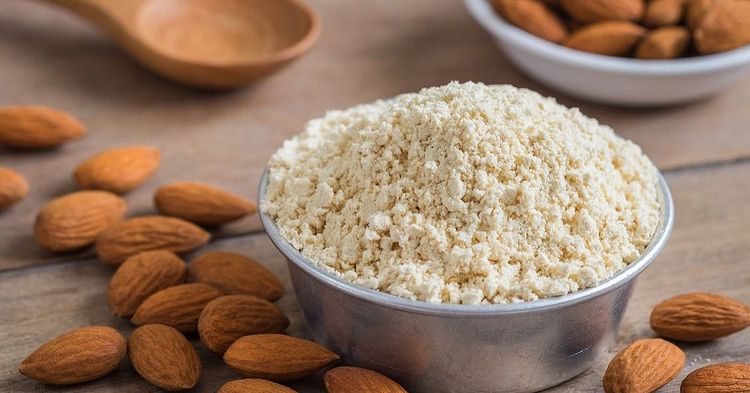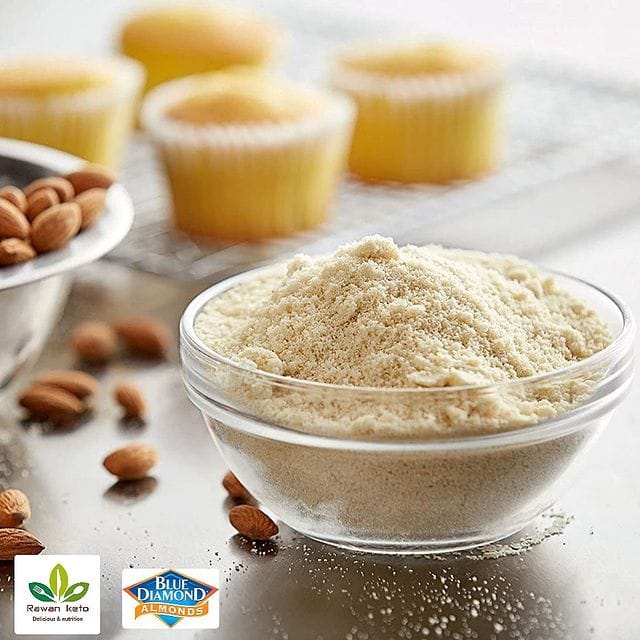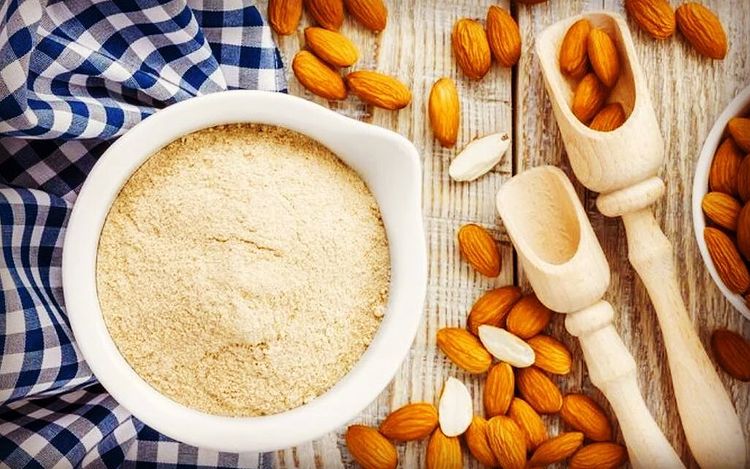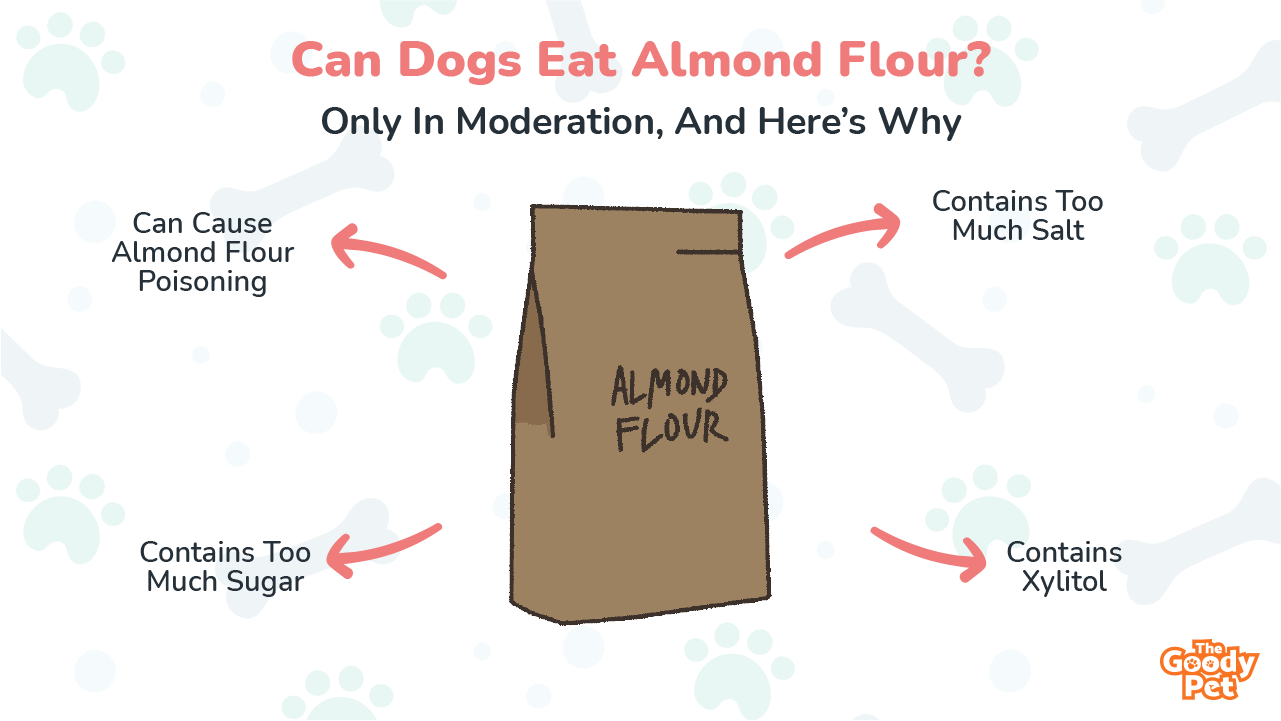Taking care of your dog’s diet is a tricky task as there are many food items that seem to be safe but can cause problems for your canine. Similarly, almond flour is also among those potentially dangerous foods.
Almond flour by itself is safe for your dog to consume, especially when it is in a small amount. But don’t let your dog consume more than a few bites of any almond flour product, as it can cause problems such as dehydration and liver failure.
There is a lot more debate on whether you should give your dog almond flour or not. Most vets have stated that it is safe to feed it, but you must stay cautious with the daily limit.
Let’s dive into the fluffy details of it!
Is Almond Flour Toxic To Dogs?

There is no harm in feeding almond flour to your dog, but you must not overfeed them. Also, check if the flour is high in salts, sugar, or fats, which is bad for dogs.
How Is Almond Flour Harmful To Dogs?
Almond flour is obtained from blanched almonds, those without skin. They include many vitamins, proteins, fiber, and phosphorus, all of which are essential for your puppy. But, it also has a high content of sugar, which is harmful to your dog.
First of all, if almond flour contains sugar, especially xylitol, you can’t feed it to your dog. Xylitol sweetener is utterly toxic for canines. It is the most significant reason why many vets recommend not providing your dog with almond flour or its products.
Almond Flour Poisoning
When the recommended serving of almond flour is exceeded, your dog will show irrational behavior such as hyperactivity and aggressiveness.
Moreover, many salts in almond flour are also dangerous for dogs. These salts can cause many heart and kidney issues. Almond flour also has high fats, which can easily upset the metabolism of your furry ball.
Moreover, there are some nutrients that dogs’ stomachs can’t digest easily, like that of humans. So, it is mainly recommended to avoid feeding them this flour in excessive quantities. But it also has some benefits, which are discussed further in the article.
Symptoms
Regarding almond flour, vets say people mostly ask, “what happens if my dog eats almond flour?” So, here are some of the common symptoms to look out for.
Other symptoms may appear from time to time if your pup is eating more than the required amount of almond flour for a prolonged period.
- Lethargy
- Liver failure
- Jaundice
- Fever
- Vomiting
- Orange urine
- Irregular heartbeats
Sometimes, apart from these symptoms, you need to monitor changes in their behavior. Different dogs show different behavioral changes, but the following are the most common ones.
- Depression
- Difficulty in breathing
- Loss in appetite
- Abdominal pain
- Weakness
Diagnosis
Once you notice the symptoms and take your pup to the vet, your vet will run tests to check the intensity of almond flour poisoning. The tests will include urine tests, stool tests, ultrasounds, X-rays, and even a diagnosis of dog vomits. It will reveal the level of poisoning and help plan the treatment.
They are to figure out if the internal structure is all right. After that, the vet will recommend suitable treatment accordingly. However, if your canine eats a large quantity of almond flour, then have your pooch brought down to the nearest vet as soon as possible. Don’t wait for symptoms to show, as every second is vital.
Treatment
The treatment primarily depends on how much almond flour has damaged your pup’s health. The prescribed medications will solely rely on what symptoms your dog shows. In case of dehydration, IV fluids treatment will be the first step. If it is aflatoxin poisoning, it may damage the liver. So, it will require vitamin K treatment.
It will heal the pancreas enough to lower the inflammation. You can give your pup low-fat meals, high fiber, and low protein foods, which will help to relieve the pain and poison.
Can Dogs Eat Treats With Almond Flour?

Yes, dogs can eat treats with almond flour. But, it is only acceptable if they have just a tiny bite or two.
You can’t exceed the limit. The treats themselves have a high sugar and artificial sweeteners (xylitol) ratio. However, giving almond flour treats can excite your canine and share joy.
So if you want to give your pup almond flour-baked cookies, then here are some delicious and healthy recipes.
Peanut Butter Almond Flour Biscuits
Ingredients
- Two ¾ cups almond flour
- ½ cup peanut butter
- ¼ cup almond milk
- One egg
- One tablespoon of salt
- One tablespoon of ground cinnamon
Procedure
- Preheat your oven to 350 °F.
- Mix all the ingredients into a bowl and make a dough.
- Take out small balls and roll them on a flat board.
- Cut out shapes from the dough with a cookie cutter.
- Take a baking pan and grease it slightly. Put the cookies into the pan.
- Bake them for about 20 minutes or until they turn brown and hard. Cool them and serve to your fluffy friend.
Blackberry Biscuits
Ingredients
- 2 ½ cup almond flour
- ½ cup blackberries
- ⅔ cup gluten-free quick oats
- One egg
- Three tablespoon water
Procedure
- Preheat the oven to 350 °F.
- Mix all the ingredients in a bowl and make doe. It will be purple colored.
- Roll the dough onto a ¼-inch sheet and cut out shapes with a cookie cutter.
- Oil the baking pan and bake the cookies for about 20 minutes or till they turn brown.
- Cool them before you serve them to your dog.
Almond Banana Bites
Ingredients
- ¼ cup almond flour
- 1 ½ cup coconut flour
- ½ cup mashed banana
- ⅓ cup almond butter
- ¼ cup almond milk
- One tablespoon of melted coconut oil
- One tablespoon of maple syrup
- Two eggs
Procedure
- Preheat your oven to 300 °F.
- Melt coconut oil and mash bananas.
- Take coconut and almond flour in a bowl and mix them thoroughly.
- Take another bowl and mix all the wet ingredients well (almond butter, coconut oil, maple syrup, banana, and eggs).
- Add flour to the wet mixture gradually from time to time.
- Pour almond milk as required and make a dough with your hands. It will feel soft and granular.
- Fill the silicone mold with dough and put it in the oven.
- Bake for about 20 minutes.
- Take out the tray, and let it cool for about 10 minutes in the mold. Then take out all the treats and cool them completely.
- Serve them to your pup.
What Type Of Flour Is Best For Dogs?
Any flour low in fats, salt and has no artificial sweetener is safe for your dog. It can be whole wheat, coconut, or almond flour. You can also look for gluten-free flour if your dog is allergic to gluten.
Although almond flour is edible for dogs, there are also better options you can choose to make treats for your canine. Here are some of them.
Whole Wheat
Whole wheat flour is a fabulous option if you want to give your pup an excellent diet and nutrition-filled treat. Whole wheat has fiber to maintain healthy guts. It contains proteins and vitamins for proper functioning. Also, it contains many minerals that are good for their metabolism.
Coconut Flour
Another excellent choice for good nutrition is using coconut flour. It is one of the best foods for dogs, and they also love its products.
It is enriched with plant proteins and is high in fiber, plus it is gluten-free. Gluten can cause a severe allergic reaction in dogs and should be best avoided, as this can affect their health and behavior.
Moreover, coconut flour contains other essential nutrients like vitamin C, which acts as an antioxidant and improves energy. It helps regulate RBC, the immune system, glucose generation, and more. Also, it contains calcium and phosphorus.

Chickpea
Dogs can eat chickpea (garbanzo beans) flour, which can be considered to be a decent substitute for almond and wheat flour. Its fiber helps in bowel movement and makes firm stool. It also regulates heart health and reduces inflammation.
Chickpea has nutrients that help your canine absorb sugar better in their blood. And also, it helps feed the good bacteria in the alimentary canal. So, you can choose chickpeas as an excellent alternative to other flours.
Oat Flour
Oat flour is another excellent choice for treats for your buddy. It contains many antioxidants to support the immune system. Oats are dense in nutrition, so your dog will have many minerals, vitamins, protein, and fiber. All will help your pup’s organs to function well.
Moreover, it is gluten-free, so there is no harm to your dog’s health. Many dogs cannot handle gluten well. Lastly, oats are low in sugar. High sugar intake can cause dogs to be hyperactive. So, don’t worry about it when feeding oat flour to your dog.
Quinoa Flour
Quinoa flour is also not harmful to your fluffy pal. In fact, its seeds are a part of high-quality dog foods. Plus, it is gluten-free and also has high insoluble fiber.
Moreover, it has vitamin B2, which helps maintain carbohydrates in the body and boosts metabolism. It doesn’t have any trans-fats and is also a great source of vital fatty linoleic acid. It is necessary for their growth and prevents skin injuries. So overall, quinoa flour is pretty good for making treats for your pup.





